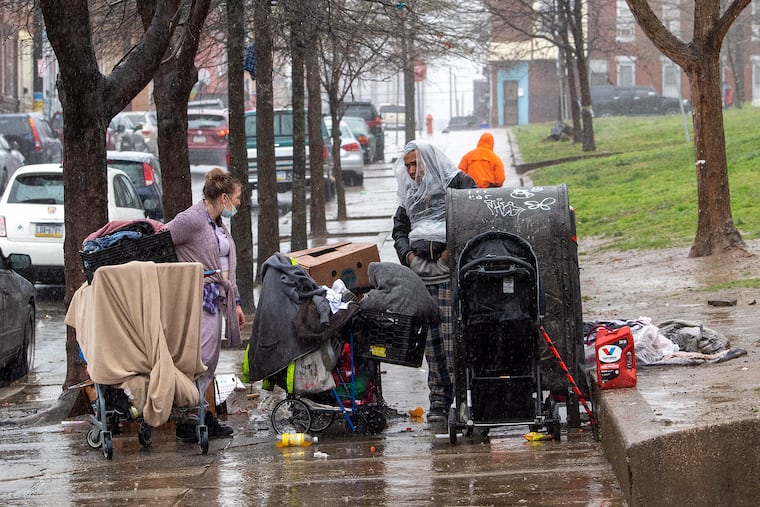Philadelphia Board of Health vacancy should be filled by mental health expert
Adding a someone trained in mental illness and addiction to the Board would be an important step to tackle the complex public health challenges our city faces.

You don’t have to be a mental health professional to see that the effects of the COVID-19 pandemic extend beyond the physical.
Worldwide, the pandemic triggered a 25% increase in the prevalence of anxiety and depression. One study in the U.S. found that suicide-related emergency room visits were more than 50% higher among girls in 2021 than in 2019.
Philadelphia is not immune, and our city is suffering. Mental health challenges such as depression, anxiety, and addiction are a result of long-standing, systemic issues that have gone mostly ignored and unaddressed.
We have seen a tragic increase in community violence, which is in part caused by the systemic trauma of poverty and racism. Marginalized communities often experience poor mental health outcomes.
» READ MORE: The role of mental health in gun violence isn’t simple, and there is no quick fix
While only 8.5% of adults living in Center City report poor mental health, that percentage nearly triples to 22.7% of adults living in Kensington. Similarly, Center City experiences 4.5 overdose deaths per 100,000 residents, while Kensington experiences 152. The violent crime rate for the city overall is 95 incidents per 10,000 people, but in neighborhoods such as Nicetown-Tioga, the rate is over 2.5 times higher.
Adding a mental health professional to the Philadelphia Board of Health — someone trained in mental illness and addiction, such as a licensed clinical social worker, psychologist, or psychiatrist — would be an important step to tackle the complex public health challenges our city faces.
The Board of Health is the policymaking body for public health in the city. It is composed of Health Commissioner Cheryl Bettigole and seven mayoral appointees, three of whom must be physicians. The Board of Health has the authority to set priorities for the Health Department, review and promote public health policy, and lead the city toward healing, health, and well-being through a public health framework.
There is currently no one on the Philadelphia Board of Health with expertise or experience in treating behavioral health or mental illness. This is a missed opportunity, one that deeply impacts the health and well-being of our city.
There is a vacancy on the Board of Health after John Rich, a primary care physician and cofounder of the Drexel Center for Nonviolence and Social Justice, stepped away from his appointment. It is critical that this vacancy be filled by someone with expertise in trauma-informed mental health and addiction.
The capacity of the existing behavioral health system in the United States and in Philadelphia is not adequate to meet rapidly increasing demand. To tackle the complex challenges of mental health that our city faces, we must prioritize mental health topics and lead from a public health approach.
Mental health is a public health issue.
The current approach to mental health care is a traditional, one-on-one treatment system, but that can’t be scaled up citywide. A public health approach to mental health care, in contrast, can address the needs of a total population through various interventions at the individual, community, and systemic levels. It is essential that our city understand mental health as a public health issue, specifically regarding the experience of trauma and adversity as the underpinning of all mental health challenges.
If the Board of Health took a mental health focus, it could ensure that mental health is considered and represented in all city policy, especially those regarding housing and homelessness, the justice system, and child welfare. For example, involuntarily hospitalizing homeless people — as the current mayor of New York City recently proposed — does not take mental health into consideration, and could simply perpetuate a cycle of violence and trauma. A mental health expert would likely urge the city to instead offer homeless people an array of services and supports, including recovery housing, shelters, or other environments that support stability and healing.
It could promote collaboration across city agencies to address the complex needs of traumatized communities and enact policy that will reduce youth exposures to adverse childhood experiences. It could also lead a citywide trauma-informed response to the COVID-19 pandemic, beginning with trauma-responsive service delivery in the city’s health systems.
Mental health and public health have traditionally been separate fields; now is the time to recognize the holistic nature of health. Mental health is a public health issue, and Philadelphia urgently needs support in addressing trauma, adversity, and violence.
Elevating the voice of a mental health expert as a part of the Board of Health’s decision-making process can be what our city needs to heal during this time of crisis.
Kate Fox is the behavioral health policy coordinator at Children First and a doctoral candidate in Health Management and Policy at Drexel University’s Dornsife School of Public Health. Her work is focused on mental health policy and advocacy.